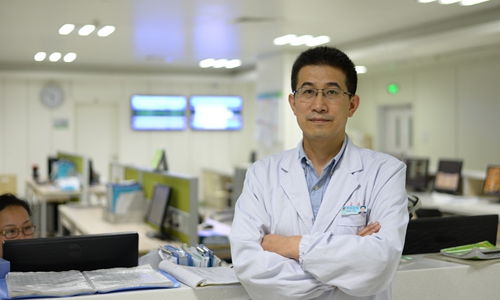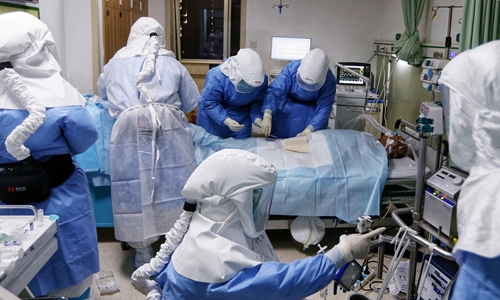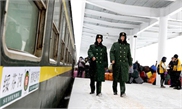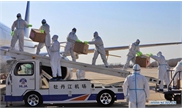
Qiu Haibo Photo: Courtesy of Zhongda Hospital Southeast University
With COVID-19 cases clearing in Wuhan, Hubei Province, Chinese intensive care expert Qiu Haibo rushed to help control the epidemic at Suifenhe port in Northeast China's Heilongjiang Province on April 26. "Wherever there are critical patients, that is where I should be," said Qiu, 54, whose hair was reported grayed within a month of his extensive work in Wuhan's intensive care units.
Since January 19, Qiu, a deputy president of Zhongda Hospital Southeast University in Nanjing, East China's Jiangsu Province, has been fighting on the frontline in Wuhan for more than 100 days, devoting himself to saving critical patients. On April 26, all COVID-19 patients in Wuhan were cleared. Assigned by the central steering group and without one day off, he left Wuhan for Heilongjiang to guide the local response to COVID-19.
Qiu advised to dispatch medical teams to aid Wuhan, increase the centralized treatment of critical patients in designated hospitals, and establish the Fangcang makeshift hospitals, as well as prone position ventilation treatment and other coping strategies. These contributions helped stabilize the epidemic and reverse its spread in Wuhan.
As the first Doctor of Critical Care Medicine in China, Qiu took the lead in establishing and developing the discipline of critical care medicine. During his 30 years of clinical practice, he was at the forefront of the fight against SARS and H1N1. Medical workers are often praised as antidromic heroes by the public. However, Qiu said he thinks of himself as more of a "straight forward person."
"The epidemic is the doctor's battlefield and I will go where patients need me, rushing forward with our own duties and missions," he noted, as the Central Commission for Discipline Inspection of the Communist Party of China reported.

Jiangsu Provincial People's Hospital medical team performs ECMO operation on a COVID-19 patient in Wuhan First Hospital on March 3. Photo: Cui Meng/ GT
Be with patients
As a member of the central steering experts group aiding Suifenhe, Qiu did not limit his work to guiding clinicians.
In the treatment of severe COVID-19 cases, endotracheal intubation is the most effective, but also the most dangerous emergency treatment following the failure of noninvasive ventilator use. Chest air can carry the virus out the moment the tracheotomy is done. Because the operation requires close proximity to the patient, even with layers of protection, there is a risk of infection. However, Qiu never hesitated to rush ahead.
Qiu admitted that he was also afraid, but "I had to do what the patient needed. Compared with saving a life, fear could be dismissed," he said.
Qiu is aware of the impact of his actions on other medical staff. "You have to be in the lead. If you're scared, other medical staff will be more scared. I want to show others that as long as the operation is standard and in place, there will be no problem," he noted.
Qiu found prone ventilation worked well for critical patients in Wuhan. Wearing heavy protective clothing, he often insisted on operating himself, turning patients over in the afternoon and turning them over again the next morning. This treatment was included in the Diagnosis and Treatment Protocol for Novel Coronavirus Pneumonia due to his advocacy.
Qiu said clinicians should be with patients. Wards are the places where clinicians should be trained, not offices or meeting rooms. "We have to go to the bedside to find out how the patient is changing, how the disease is developing, whether my treatment is working or not," Qiu explained.
Thanks to the efforts of medical workers such as Qiu and many anti-epidemic staff, the epidemic situation in Heilongjiang is well under control. According to Heilongjiang Health Commission, there are 102 imported cases still under treatment and 284 imported cases were cured and discharged as of Wednesday. As a result, the epidemic risk level of Suifenhe was adjusted from medium risk to low risk on Wednesday, the Xinhua News Agency reported.
Patients in severe isolation often face psychological anxiety and fear in addition to physical pain.
At an ICU in Wuhan Jinyintan Hospital, a critical patient in his 30s became agitated. Qiu gave him a pen to write down his frustrations. The patient wanted to call his parents to check on them. After the patient knew his parents were well, he calmed down and recovered well.
Although the virus is highly contagious and patients with critical cases needs to be isolated, we should give patients warmer care from heart, Qiu said, as China National Radio reported.
Strict but warm
Qiu treats patients warmly but adopts a zero tolerance towards mistakes at work. When he reviews students' thesis, he edits 10 versions. After students answer about symptoms of patients suffering shock, he asks more details about patients' consciousness, the look on their faces, and the color of their limbs, thus teaching students that knowledge from the book must be combined with clinical experience, reported Xinhua.
Medics were said to feel under pressure when it was Qiu's turn to make rounds of the wards because of his strict attitude. "He is not the supervisor who would just listen to the brief, but pay attention to every medicine used for patients, and read every treatment plan," said Pan Chun, one of Qiu's students, adding that, "Doctors were required to report any changes of a patients' condition to him, even if it's a detail about a tube." Pan is also a chief physician supporting Wuhan.
While being strict and tough at work, Qiu is warm and caring person with family. In an interview with the China Central Television, Qiu said that during his three months in Wuhan, his wife was suffering back pain and was left home alone. She wanted him to come home as soon as he could.
Qiu couldn't help but shed tears telling his wife about the sudden decision to go to Heilongjiang. "It's OK, just go, I am fine," said his wife who knows well her husband's professional dedication.
Qiu went viral online for his hair graying within one month of aiding Wuhan. He explained it was just the exposure problem, but every day and night in Wuhan was indeed stressful.
Qiu said he did not feel stressed at the temporary decision to aid Heilongjiang, however, he always cared for his wife and elders in his family, hoping to return home early and victorious in the anti-epidemic battle.


